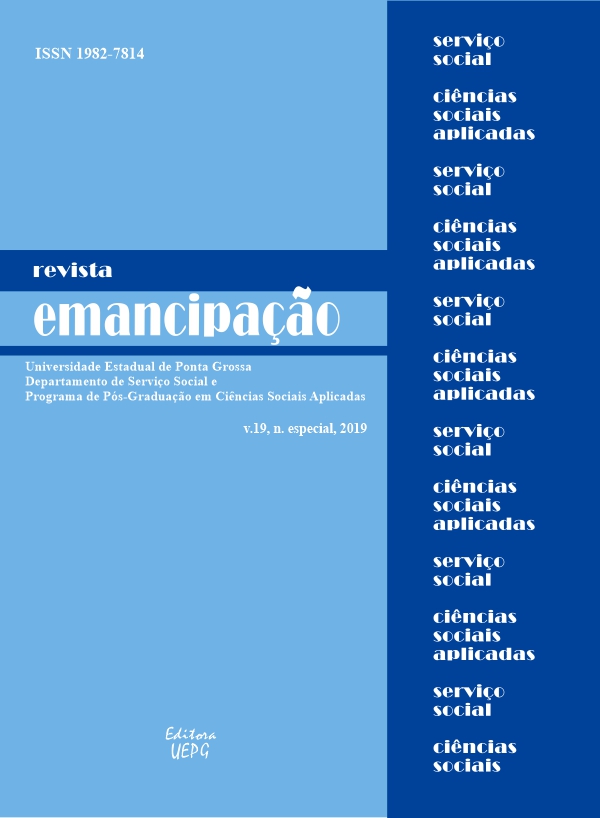El surgimiento del cooperativismo en el Perú: la Convención- Cusco (The emergence of cooperativism in Peru: the Convention- Cusco)
Conteúdo do artigo principal
Resumo
Las actuales cooperativas y asociaciones que aún persisten en La Convención cuentan con intensas luchas protagonizadas por los campesinos de la época, durante la década de 1940 a 1960, con el objetivo de mantenerse activos. Históricamente, el cooperativismo surge en Europa, en Gales a fines del siglo XVIII. Sin embargo, en el continente suramericano, caso peruano, la primera cooperativa cafetalera surge en la provincia de La Convención, ubicada en el departamento del Cusco. La cooperativa cafetalera emergió a partir del primer sindicato, organizado por campesinos a consecuencia de la violencia, la opresión, los precios injustos de los productos, del abuso y la esclavitud por parte de los hacendados. El objetivo del presente trabajo es analizar el proceso del surgimiento y creación de las cooperativas en el Perú, específicamente en la región del Cusco, debido a que la primera cooperativa histórica surge en esa región, que fue impulsada por los campesinos. La metodología adoptada será basada en la revisión bibliográfica.
Downloads
Detalhes do artigo
Autores que publicam nesta revista concordam com os seguintes termos:
a) Os autores mantém os direitos autorais e concedem à revista o direito de primeira publicação, com o trabalho simultaneamente licenciado sob a Creative Commons Attribution License (https://creativecommons.org/licenses/by/4.0/deed.pt_BR) que permite o compartilhamento do trabalho com reconhecimento da sua autoria e publicação inicial nesta revista.
b) Esta revista proporciona acesso público a todo o seu conteúdo, uma vez que isso permite uma maior visibilidade e alcance dos artigos e resenhas publicados. Para maiores informações sobre esta abordagem, visite Public Knowledge Project, projeto que desenvolveu este sistema para melhorar a qualidade acadêmica e pública da pesquisa, distribuindo o OJS assim como outros softwares de apoio ao sistema de publicação de acesso público a fontes acadêmicas. Os nomes e endereços de e-mail neste site serão usados exclusivamente para os propósitos da revista, não estando disponíveis para outros fins.
This journal provides open any other party.
Esta obra está licenciada sob uma Licença Creative Commons.
https://creativecommons.org/licenses/by/4.0/deed.pt_BR.

Referências
BARRIGA, P. R. F. Funcionamiento de cooperativas cafetaleras y su impacto en la vida familiar de sus asociados: casos de familias de dos sectores de la provincia de La Convención vinculadas a la Cooperativa Maranura y a la central de cooperativas COCLA. 2009. 236 f. Tesis (Licenciatura en Antropología) – Facultad de Ciencias Sociales, Pontificia Universidad Catolica del Peru, Lima, 2009.
CRAIG, W. El movimiento campesino en La Convención: la dinámica de una organización campesina. Lima: Instituto de estudios peruanos, Série Documentos Teóricos, n. 11, 1968.
CAMACHO, L. E. S.; MOROTE, N. I. M. La ocupación temprana en La Convención, selva alta de Cusco. Investigaciones Sociales, Lima – Perú, v. 16, n. 28, p. 167-184, 2012.
DUVAL, L. Estudio de los efectos y del impacto del comercio justo certificado en el Perú y en República Dominica: Estudio en la organización de productores COCLA, Perú. France: FBE, ene. 2008.
EGUREN, F. Reforma agraria y desarrollo rural en el Perú. Rural Finance & Investment Learning Centre, Lima, 2006. Disponible en: <http://www.ruralfinanceandinvestment.org/sites/default/files/1248203802936_01__eguren_peru.pdf>.Accesado el 22 jun.2019.
MLADENATZ, G. História das doutrinas cooperativistas. Brasília: Editora Confebras, 2003.
MARTINEZ, C. S. Prestigiosa Institución Cusqueña está logrando éxitos em el Cusco. Micro Finanzas, Lima – Perú, ene. 2018. Disponible en: <https://microfinanzas.pe/2017/index.php/2018/enero/567-prestigiosa-institucion-cusquena-esta-logrando-exitos-en-el-cusco>. Accesado el 20 mai. 2019.
SALAS, C. P. Subsistema estrictamente coordenado de café: central de cooperativas agrarias de La Convención y lares “COCLA”. 2014. 52 f. Tesis (Especialista en Agronegocios y Alimentos) – Facultad de Agronomía, Universidad de Buenos Aires, Buenos Aires, 2014. Disponible en: <http://ri.agro.uba.ar/files/download/tesis/especializacion/2014salaspenacarlos.pdf>.Accesado el 25 jun. 2019.

